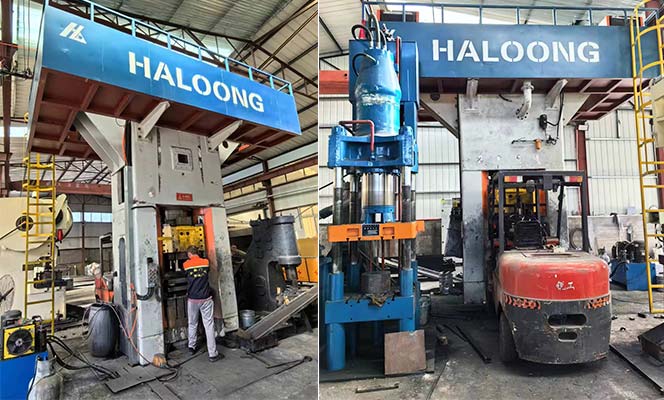In the field of metal processing, servo forging press and ordinary forging press are commonly used equipment, the main difference between them is the drive method and control accuracy.
Driving mode
Ordinary forging presses are usually driven by hydraulic pressure or air pressure, and the flow of hydraulic pressure or gas is controlled by a valve to achieve movement. The advantages of this drive mode are simple structure and easy maintenance, but the response speed is slow, and it is difficult to achieve accurate positioning and speed control.
The servo forging press is driven by servo motor, and the precise control of the motor is realized by the controller. The advantages of this drive mode are fast response speed, accurate positioning, and high precision forging processing.

Control accuracy
The control accuracy of ordinary forging press is usually low, and it mainly relies on the experience and technical level of the operator to achieve the control of processing quality. Due to the lack of precise control, ordinary forging presses are vulnerable to external interference in the production process, such as temperature changes, material hardness, etc., resulting in unstable product quality.
The control precision of servo forging machine is high, and the controller can realize the precise control of the motor, which can realize the high precision forging processing. At the same time, the servo forging press also has automatic adjustment and compensation functions, which can automatically adjust parameters according to the changes of processing conditions to ensure the stability of product quality.
Energy consumption and efficiency
Due to the more advanced drive and control mode of the servo forging press, its energy consumption and efficiency are usually higher than that of the ordinary forging press. The servo motor has the characteristics of high efficiency and fast response, and can complete a large number of forging work in a short time, and the energy consumption is low, which helps to reduce the production cost.
Scope of application
Ordinary forging press is suitable for large volume, simple shape forging production, such as shaft, plate and so on. Because of its low control accuracy, it is difficult to produce complex shape forgings.
Servo forging press is suitable for small batch, complex shape forging production, such as aerospace, automotive, precision machinery and other fields of high-end products. Due to its high precision and high efficiency, it can meet the strict requirements of high-end product production.
In summary, the main difference between the servo forging press and the ordinary forging press is the drive mode, control accuracy, energy consumption and efficiency, and the scope of application. When choosing which equipment to use, it is necessary to comprehensively consider production needs and product characteristics.